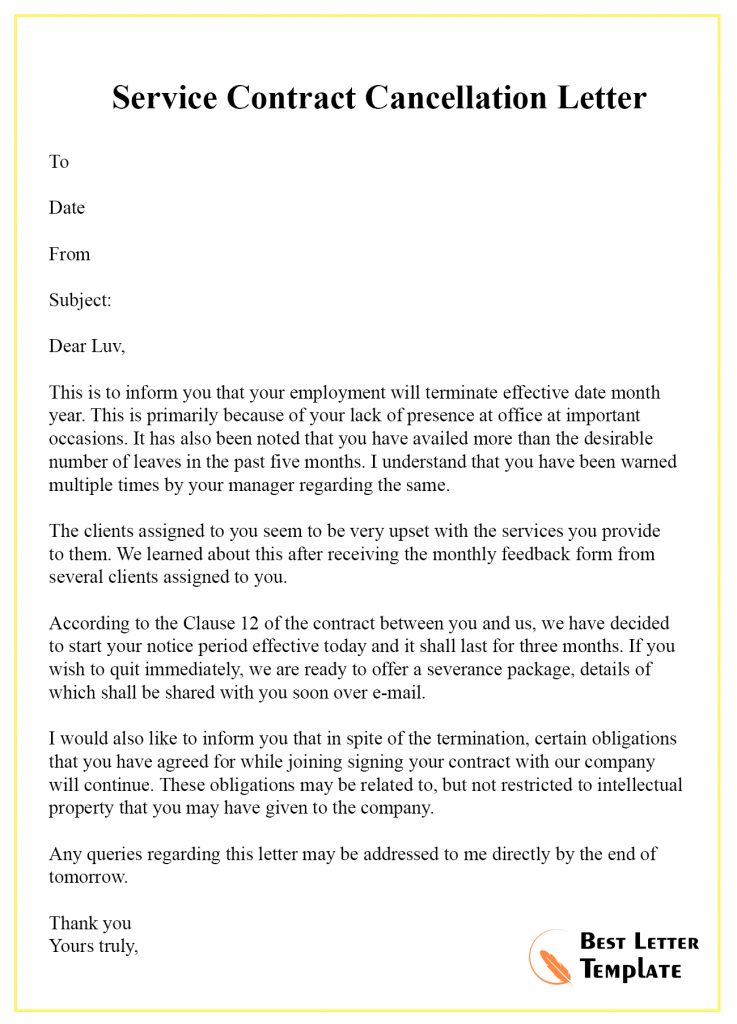Exiting Agreements Contract Termination Letter Templates and Best Practices
Ever felt trapped in an agreement that no longer serves you? Breaking free from a contract can feel daunting, but with the right approach and a well-crafted contract termination letter, it can be a surprisingly straightforward process. This guide dives into the essentials of contract termination letters, providing you with the tools and knowledge to navigate this sometimes tricky terrain.
A contract termination letter, sometimes referred to as a contract cancellation letter, is a formal document that communicates your intent to end a contractual agreement. It's a crucial step in protecting your interests and ensuring a clean break from the agreement. From simple subscription services to complex business partnerships, understanding the nuances of termination letters is essential in today's interconnected world.
While the concept of formal agreements dates back centuries, the modern form of contract termination letters evolved alongside the rise of complex commercial transactions. As businesses and individuals entered into more intricate agreements, the need for a standardized method of dissolving those agreements became apparent. This led to the development of specific legal language and structures for termination letters, helping to minimize disputes and ensure clarity for all parties involved.
A well-written contract termination letter offers several key advantages. It provides a clear record of your intent to terminate, protecting you from potential legal complications. It also allows for a smoother transition out of the agreement, minimizing disruption for both parties. Finally, a professionally written termination letter can help maintain a positive relationship with the other party, even after the agreement has ended.
Failing to properly terminate a contract can have significant consequences. You could be held liable for ongoing payments or other obligations, even if you're no longer benefiting from the agreement. Disputes can arise, leading to costly legal battles. Therefore, understanding and utilizing contract termination letter templates is crucial for anyone involved in contractual agreements.
A contract termination letter typically includes the following elements: your name and address, the recipient's name and address, the contract's effective date, a clear statement of your intent to terminate, the reason for termination (if required), the effective date of termination, and your signature.
One benefit of using a contract cancellation letter is clarity. It provides a documented record of the termination, preventing future misunderstandings. For example, if you cancel a gym membership with a letter, you have proof of your cancellation date should they continue to bill you.
Another benefit is protection. A formal termination letter protects your legal rights. Imagine you terminate a service contract, and they claim you owe them further payments. Your letter serves as evidence of your timely cancellation.
Lastly, it promotes professionalism. A formal approach strengthens your credibility and maintains a respectful relationship with the other party, even in the context of termination. For example, if you're ending a business partnership, a professional letter can help smooth the transition and prevent unnecessary conflict.
To terminate a contract, follow these steps: Review your contract for termination clauses. Draft a letter stating your intent to terminate, referencing the relevant clause. Include required information like dates and reasons. Send the letter via certified mail for proof of delivery. Keep a copy for your records.
Contract Termination Letter Checklist:
Your contact information
Recipient's contact information
Contract effective date
Clear termination statement
Reason for termination (if required/applicable)
Termination effective date
SignatureAdvantages and Disadvantages of Using Contract Termination Letters
| Advantages | Disadvantages |
|---|---|
| Provides clear documentation of termination | Can be time-consuming to draft |
| Protects your legal rights | May require legal advice in complex situations |
| Maintains a professional relationship | Doesn't guarantee acceptance of termination if not in accordance with the contract |
Best Practices: 1. Always review your original contract before drafting a termination letter. 2. Be clear and concise in your language. 3. Send the letter via certified mail. 4. Keep a copy of the letter for your records. 5. Consult with an attorney if you have any questions or concerns.
FAQs:
1. What is a contract termination letter? A formal document stating your intent to end a contract.
2. When do I need one? When you want to end a contractual agreement.
3. What should it include? Your and the recipient's information, contract dates, a termination statement, and signature.
4. How do I send it? Certified mail is recommended for proof of delivery.
5. What if the other party disputes the termination? Consult with an attorney.
6. Can I terminate a contract at any time? Depends on the contract terms.
7. Where can I find a template? Search online for "contract termination letter sample."
8. What if I don't have a reason for termination? Some contracts allow for termination without cause.Tips and Tricks: When terminating a contract, always refer to the original agreement for specific termination clauses and procedures. Keeping detailed records of all communication related to the termination process is also crucial.
In conclusion, understanding the process of contract termination and utilizing a well-crafted contract termination letter is crucial for anyone involved in contractual agreements. Whether you're ending a subscription service, dissolving a business partnership, or navigating any other type of contractual relationship, a clear and concise termination letter protects your interests, ensures a smooth transition, and minimizes the potential for future disputes. By following best practices, utilizing available resources like contract termination letter samples, and seeking legal counsel when necessary, you can navigate this process with confidence and maintain control over your contractual obligations. Taking the time to understand and implement these strategies empowers you to effectively manage your agreements and protect your legal rights. Don't hesitate to seek professional advice if you encounter complex situations or have any doubts about the termination process. Being proactive and informed ensures a smooth and successful exit from any unwanted agreement.
That grinding noise when you turn understanding metal rubbing sounds
Wheel stud measurement a comprehensive guide
Understanding baystate medical center springfield ma npi














